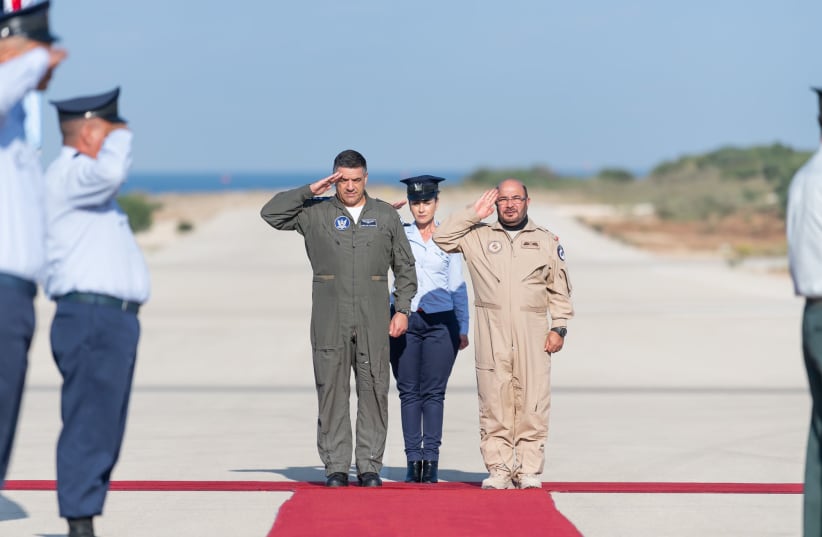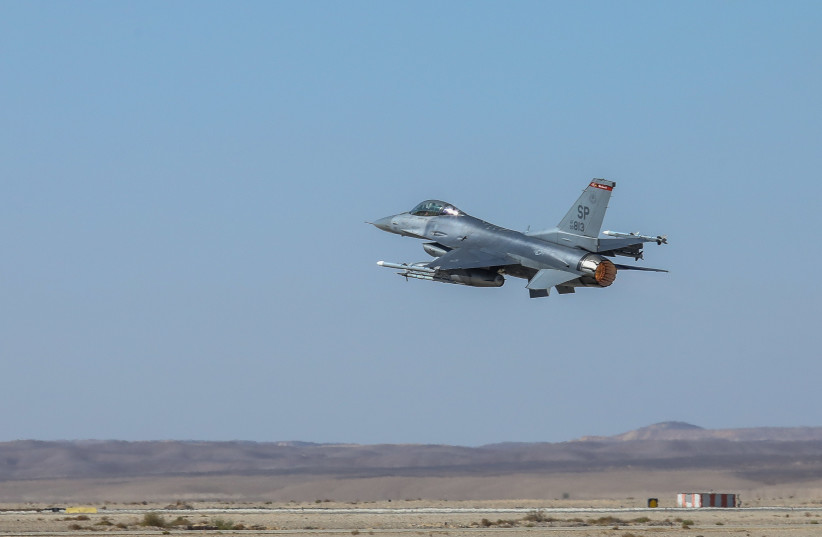A year after the signing of the Abraham Accords, which normalized ties between Israel and the United Arab Emirates, the Commander of the Kingdom’s Air Force Maj.-Gen. Ibrahim Nasser Mohammed al-Alawi landed in Israel for the first time.
Al-Alawi is in Israel as the guest of Israel Air Force Commander Amikam Norkin to take part in a conference for countries flying the F-35 during the large-scale international Blue Flag aerial exercise.
Historic: The Commander of the UAE's Airforce Maj.-Gen. Ibrahim Nasser Mohammed al-Alawi has landed in Israel for the first time as a guest of IAF Chief Maj.-Gen. Amikam Norkin. He received an honor guard led by Norkin at Palmachim air force base pic.twitter.com/G18MRMSGIH
— Anna Ahronheim (@AAhronheim) October 25, 2021
He received an honor guard led by Norkin at Palmahim Air Force Base south of Tel Aviv and discussed developing cooperation and strengthening the connection between the two Middle Eastern air forces.
“I thank you, Commander of the Emirati Air Force, for your willingness to come to Israel,” Norkin told him. “This is a historic and important day for cooperation between the air forces.”
Israel is the second country after the United States to have received the joint strike fighter and is the only air force in the Middle East to fly the state-of-the-art F-35 aircraft.
Abu Dhabi has made no secret that it is interested in purchasing the fifth-generation fighter jet that the IAF has flown during numerous missions in the region, including as part of Israel’s war-between-wars campaign to thwart the entrenchment of Iranian forces along Israel’s northern border.
Both Israel and the UAE have worked together covertly for years against Iran’s hegemony and, according to foreign reports, have improved their intelligence-sharing and military relations behind closed doors in order to be prepared for Iranian threats.
Alawi’s public visit further cements the ties that are flourishing between the two countries, including in the field of defense. It also sends a message to Iran.
Defense Minister Benny Gantz has spoken with his counterpart in the UAE, Mohammed bin Ahmad Al Bawardi, with the two discussing security cooperation in order to strengthen the stability of the region.
In March, Gantz told Reuters that Israel intends to develop a “special security arrangement” with Gulf states who share common concerns about Iran and its regional aggression.
Today, we made history United Arab Emirates Air Force Commander Maj. Gen. Al Alawi was welcomed to Israel by IAF Commander Maj. Gen. Amikam Norkin. Together, the commanders made a significant step toward future cooperation and strengthened military ties. #BlueFlag2021 pic.twitter.com/jabNRayvwj
— Israel Defense Forces (@IDF) October 25, 2021
“I don’t think it’s going to be a defense pact but we are going to develop defense relations with every country that we have relations with,” Gantz said. “We have this process of setting up a special security arrangement, and within this arrangement, we can continue and develop our relations.”
In January, Israel was moved from America’s EUCOM (European Command, which currently focuses on Russia and its threats against Europe and NATO) to CENTCOM’s area of responsibility.
The move to CENTCOM is believed to not only simplify the cooperation with American troops in the region but can also create the potential for a regional coalition with Arab countries that have normalized ties with Israel against shared threats posed by Iran.
Both Kohavi and Gantz believe that moderate Sunni states such as the United Arab Emirates and Bahrain, as well as others that have not yet signed agreements with Israel can deepen their ties, especially in terms of regional security arrangements.
Israel has flown alongside UAE pilots in other international exercises, such as Iniohos 2019, Greece’s largest military exercise. Following the signing of the Abraham Accords last year and the current visit by Alawi, it is believed that other regional countries will take part in future IAF exercises.

